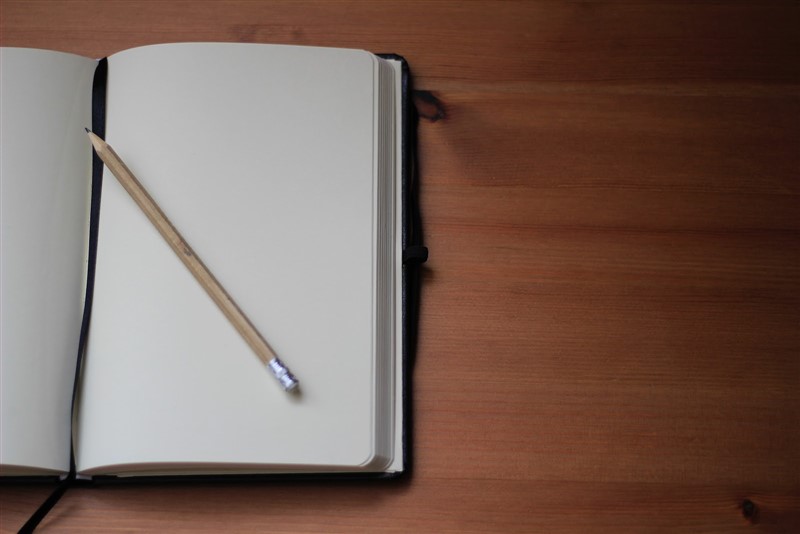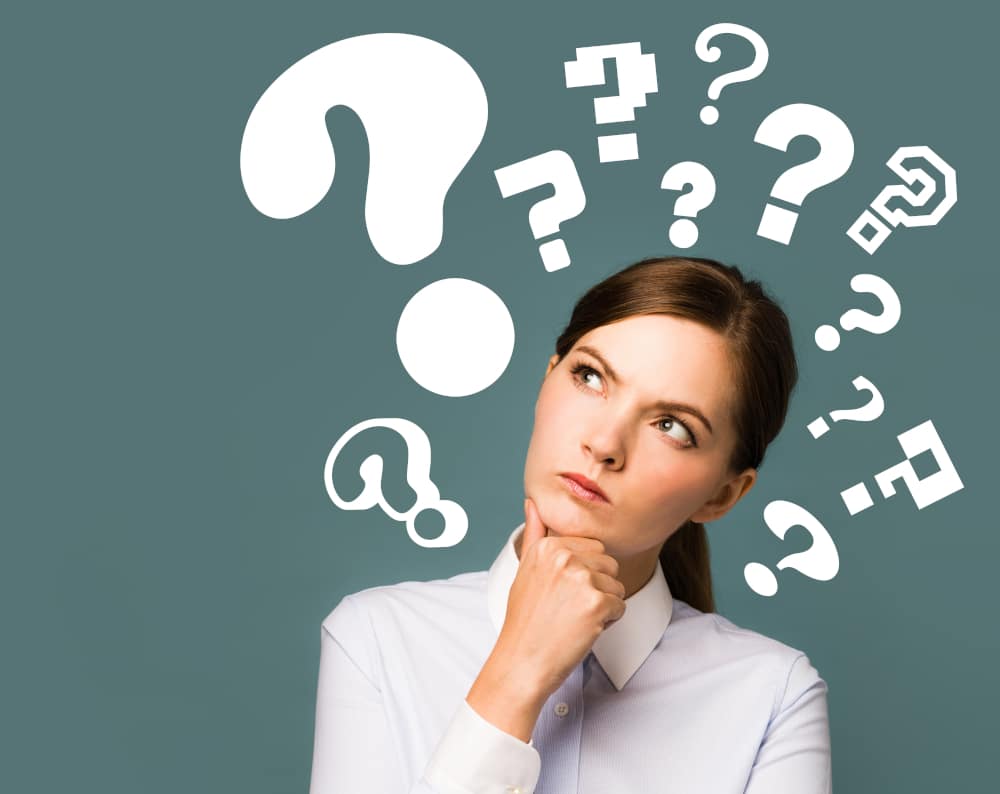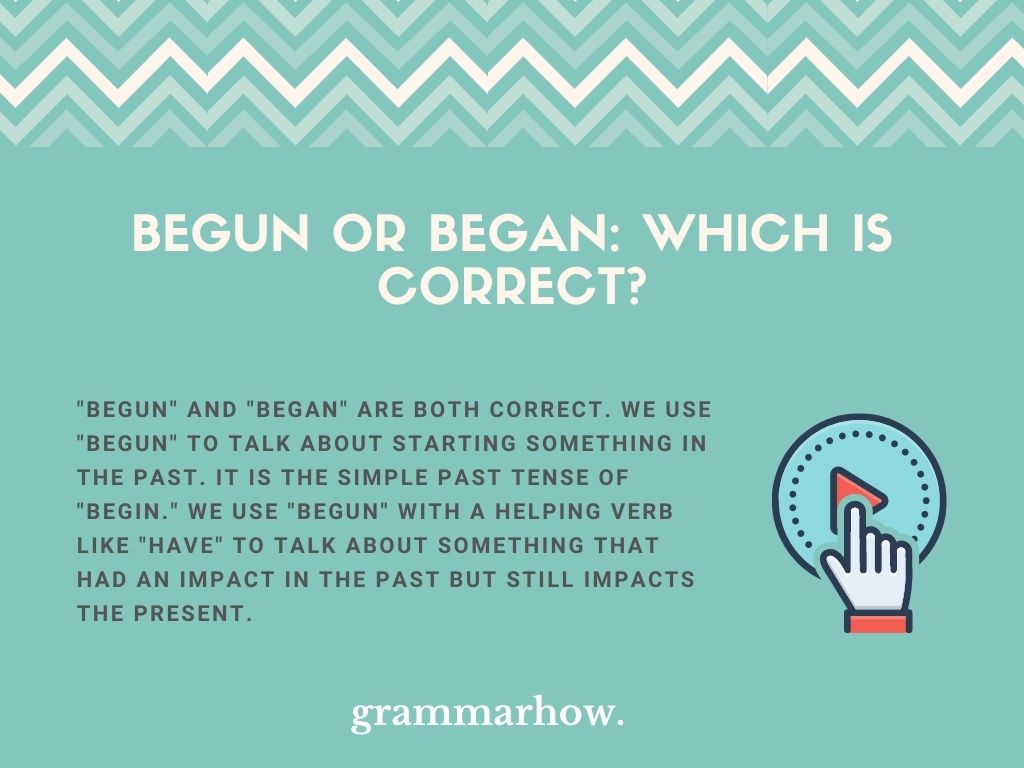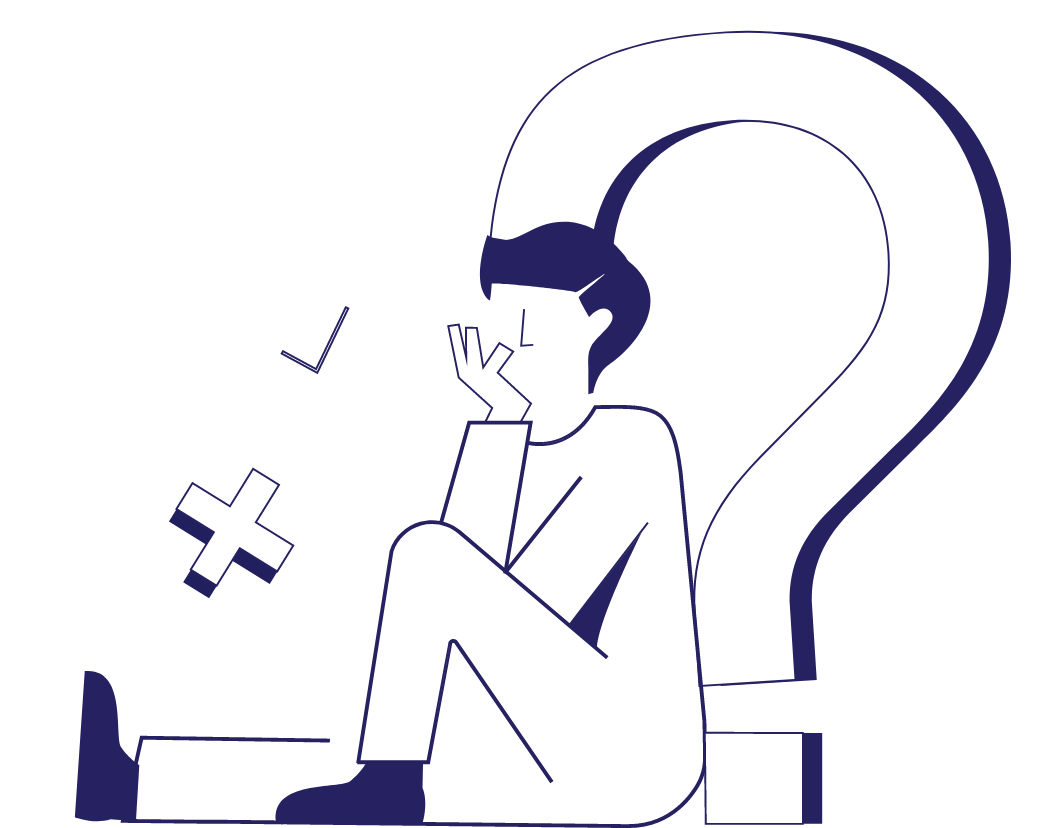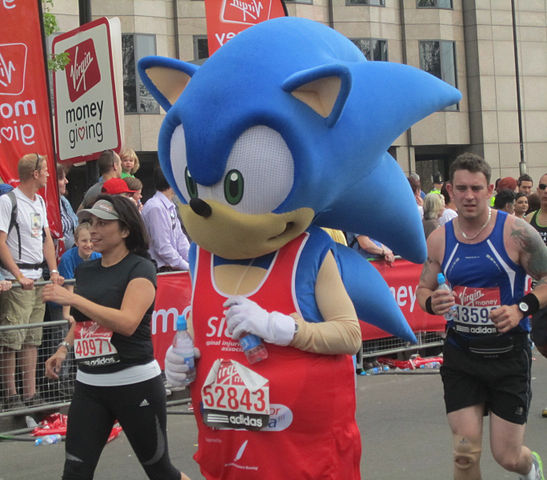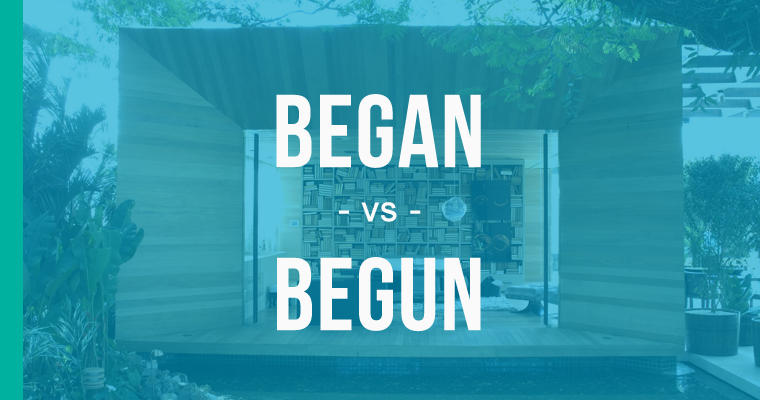What is the difference between began and begun?
Misusing the words began and begun is one of the most common mishaps in English grammar. Sure, the words look and sound similar enough, but there’s a right and wrong way to use them in a sentence.
The words began and begun are different forms of the irregular verb “to begin.” We use the verb “begin” for actions that ‘start,’ ‘initiate’ or ‘launch’ an activity or process. For example,
“Dinner begins with an appetizer.” (present tense)
“We began dinner with an appetizer.” (simple past tense)
“We’ve begun to eat dinner.” (present perfect tense)
As shown above, we use “began” for the past tense and “begun” as the past participle for all perfect tenses. Additional verb forms include begins (plural present) and beginning (present continuous/progressive).
”To begin” as an irregular verb…
There are several reasons why began and begun are commonly confused words, starting with the irregularities of the verb “begin.” Regular verbs consist of a simple past tense form with a present and past participle. Additionally, a regular verb’s simple past and past participle ends with -ed, such as “learned,” “passed,” or “separated.”
If “begin” were a regular verb, the past tense and past participle forms would look something like “begined”–– which is, clearly, not the case. Instead, the verb tense forms of begin look something like this:
- Simple past tense: began
- Present tense: begin/begins
- Future tense: begin
- Progressive tense: beginning
- Perfect tenses: begun
Beginner vs. beginning?
Another reason why it’s easy to confuse began vs. begun: similar, yet different words that start with “begin.” Do the nouns “beginner” or “beginning” ring a bell?
In addition to acting as the progressive tense form, the word “beginning” is also a noun. As explained by The American Heritage Dictionary, the noun “beginning” is ‘the time or place when something starts,’ ‘the earliest time of initiation,’ or ‘a source or cause.’ In this case, telling someone to “start at the beginning” is different from saying “something is beginning.”
Likewise, the noun (or adjective) “beginner” describes someone or something deemed ‘entry-level,’ ‘new,’ or ‘just starting to learn something.’ For example, if you’re taking an ESL class, you might be a “beginner-English student.” Or, if you start a new exercise class, you could enroll in a “beginner’s course” to get started.
What does begin mean?
The word begin is an irregular verb that means ‘to start,’ ‘arise,’ ‘perform,’ or ‘undergo the initial part of an action.’ Specific definitions and examples of “begin” include:
1. To initiate or ‘set about’ an activity or process. For example,
“She began writing after work.”
“Let’s begin with chapter 4.”
“The race begins at noon.”
“He’s in the beginning process of cleaning the garage.”
“They’ve already begun reading.”
2. To arise or originate in existence. For example,
“My life began in the early 90s.”
“A new day begins whether you like it or not.”
3. To establish or start an organization, process, or activity. For example,
“The book club began with only three members.”
“The private school was begun by local chapter members.”
Phrases with the verb begin:
As noted by Lexico, English speakers use the verb begin for several phrases, including:
- “Begin/began to do something:” to start at an initial task, time, or place.
- “Begin with:” to start with an initial element.
- “Begin on/upon:” to start working or stating something.
- “Begin at:” a minimum cost of something or to not have any likelihood of occurring.
- “To begin with:” to start with something first.
Synonyms
Actualize, appear, arise, commence, constitute, develop, embark, emerge, enter, establish, form, found, generate, inaugurate, initiate, innovate, institute, launch, materialize, open, originate, pioneer, start, surface, take-on, undertake.
Antonyms
Abolish, annihilate, annul, cease, close down, conclude, destroy, discontinue, end, expire, finish, halt, lay off, nullify, phrase out, shut up, stop, terminate, wrap up, quit.
Etymology of begin
According to The New Oxford American Dictionary, the word begin originated with Old English beginnan via early Germanic languages and is related to Dutch and German beginnen (“Begin” 150).
How to use began vs. begun in a sentence?
Now that we understand the definition and irregularities of the verb ‘to begin,’ it’s time to learn how to craft “began” and “begun” into a sentence. As a partial recap, let’s look at which verb tenses we use for all verb forms of begin.
Begin:
- Present tense: begin/begins
- Future tense: will begin
Began:
- Simple past tense: began
Begun:
- Future perfect tense: will have begun
- Present perfect tense: have/has begun
- Past perfect tense: had begun
Beginning:
- Present continuous tense: am/are beginning
- Past continuous tense: was/were beginning
- Future continuous tense: will be beginning
- Present perfect continuous tense: have/has been beginning
- Past perfect continuous tense: had been beginning
- Future perfect continuous tense: have been beginning
When to use began vs. begun
As shown through prior verb lists, the only time we use “began” is for the simple past tense. For example,
“I began reading Jane Austin novels.”
“He began every text message with an emoji.”
“They began dancing and singing.”
Meanwhile, the word “begun” only occurs for the past, present, and future perfect tenses. Example sentences include,
“By Friday, every resident will have begun the voting process.” (future perfect)
“The city has begun decorating for fall.” (present perfect)
“We had begun celebrating by then.” (past perfect)
Writing tips for begun vs. began
The second lesson for using “begun” and “began” involves grammar and context:
Use “began” to reference a former title
If you’re looking to reference someone’s former or initial role, “began” is the best word choice. For example:
- Correct: “She began as the assistant.”
- Incorrect: “She begun as the assistant.”
Using “began” with inanimate subjects?
If you use “began” with an inanimate object or thing, the verb may imply that something originated or materialized into existence. For example,
“Crater Lake began as a natural disaster.”
“The post office began their deliveries at 5 a.m.”
“The floor began to shake.”
Only use “to” before “begin”
Whenever you read the word “to” before a verb, that’s because it’s written in the infinitive form (e.g., ‘to begin’). The infinitive form of a verb only contains the root word, so it’s incorrect to use other tense forms.
- Use: “to begin.”
- Don’t use: “to began,” “to begun,” “to beginning,” etc.
One last note: If you choose to use the infinitive phrase, beware of using “with” afterward. According to Garner’s Modern English Usage, “to begin” is an introductory phrase that we use to enumerate a reason. Therefore, writing the phrase “to begin with” can imply a chronological order, whether it’s intended or not (Garner 102).
To illustrate, compare the implied meaning of each example sentence:
- “We are going to begin with reading.” vs. “We are going to begin reading.”
- “She’s to begin with Spanish 101.” vs. “She’s to begin Spanish 101.”
Can you tell the difference? The examples above all convey a command, but using “with” appears more demanding because it implies a negated option. Let’s look at one more:
- “I don’t know what to begin with.” vs. “I don’t know what to begin.”
For the final example, the appearance of “with” nearly changes the entire meaning of the sentence. The first example implies there are several options ‘to start,’ but the second example can imply that someone is confused or unaware of a task at hand.
Avoid using auxiliary verbs with “began”
One of the trickier rules for “began” involves auxiliary verbs or ‘helping verbs.’ Most English speakers are aware of other auxiliary verbs like “to have,” “to do,” or “to be” because they allow other verbs to express their tense forms. But in the case of ‘begin,’ we don’t use auxiliary verbs for its past participle form.
As noted by GMEU, linguists have made examples of phrases like ‘has began’ as “careless speech” and “writing” since 1951–– a writer’s worst nightmare, if you ask us (Garner 102). To avoid these embarrassing call-outs, avoid pairing auxiliary verbs with “began” at all costs!
Correct:
- “He will begin.”
- “She has begun.”
- “We have begun.”
- “I will have begun.”
Incorrect:
- “He will began.”
- “She has began.”
- “We have began.”
- “I will have began.”
Want to learn more about verbs?
If you enjoyed learning about began vs. begun, check out our recent posts on verbs like:
- Inquire vs. enquire?
- Is vs. are?
- Lets vs. let’s?
- Into vs. in to?
- Chose vs. choose?
Test Yourself!
Confusing words like began and begun have a bad rap for a reason. See how well you understand their differences with the following multiple-choice questions.
- True or false: “began” and “begun” are different forms of the verb “begin.”
a. True
b. False - The word ____________ is the past participle form of begin.
a. Began
b. Begin
c. Begun
d. Beginning - The word ____________ is the simple past tense form of begin.
a. Began
b. Beginning
c. Begun
d. Begin - Forms of the irregular verb “begin” don’t include _____________.
a. Begins
b. Beginner
c. Beginner
d. Began - The future tense of the verb “begin” is _____________.
a. Beginning
b. Began
c. Begun
d. Begin
Answers
- A
- C
- A
- B
- D
Sources
- “Begin.” Garner’s Modern American Usage, 3rd ed., Oxford University Press, 2009, pp. 102.
- “Begin.” Lexico, Oxford University Press, 2020.
- “Begin.” The Merriam-Webster.com Dictionary, Merriam-Webster Inc., 2020.
- “Begin.” The New Oxford American Dictionary, 3rd ed., Oxford University Press, 2010, pp. 150.
- “Beginner.” The American Heritage Dictionary of the English Language, 5th ed., Houghton Mifflin Harcourt Publishing Company, 2020.
- “Beginning.” The American Heritage Dictionary of the English Language, 5th ed., Houghton Mifflin Harcourt Publishing Company, 2020.
- “Irregular verbs: overview and list.” OWL at Purdue, Purdue University, 2020.
- “To begin.” Reverso Conjugation, Reverso-Softissimo, 2020.
By
Last updated:
March 29, 2023
Began and begun often get mixed up in English.
These two verb forms come from the English infinitive “to begin.”
“Began” is in the simple past tense: He began to play the guitar.
“Begun” is a past participle that’s used in a perfect tense, so it always comes with “has,” “have” or “had:” It had begun to rain by the time I got home.
So, are you ready to dive deeper into these two words? Let’s get started!
Contents
- Began: Simple Past Tense
- Begun: Past Participle in Perfect Tense
- Another Way to Express “Began” or “Begun”
- Idiomatic Expressions with the Verb “To Begin”
Download:
This blog post is available as a convenient and portable PDF that you
can take anywhere.
Click here to get a copy. (Download)
Began: Simple Past Tense
As noted in the introduction, “began” and “begun” are different forms of the verb “to begin.” Most commonly, it describes an action that is starting to happen, as in the following sentence:
He begins to read.
Let’s look at “began” first. Whenever we use “began” in English, we always have to remember to use it on its own.
“Began” is the simple past tense of “to begin.” This tense is used for an action (of any duration) that has finished in the past:
- It began to rain.
- She began to sing.
- I began to cry when I saw the disgusting lunch menu.
- You began to run because you were afraid of the dog.
As you can see in the last two examples, “began” can be used before a conjunction (like the word “when”) to introduce another clause (e.g. I saw the disgusting lunch menu).
Whether you’re starting your sentence with I, you, he, she, we or they, “began” stays the same. Phew!
You’ll also notice that “began” is always used by itself, unlike “begun,” which we’ll tackle in the next section.
Begun: Past Participle in Perfect Tense
“Begun” can never be on its own and always needs an auxiliary verb hanging around. If you can remember this difference, you’ll make the right choice about which word to use.
The most common auxiliary verb forms come from the English verb “to have.” (For example: had, has, have and will have.)
Unlike the simple past, “begun” is a past participle that’s used with the three perfect tenses: past perfect, present perfect and future perfect. They also describe a completed action but are more complex, suggesting how a previous action affects a current condition. For example:
I had begun to style my hair for the party when I realized there was a storm outside.
To construct these sentences, we need to start with the auxiliary verb, then add “begun” afterward:
- They had begun to play soccer before I got there.
- He has begun to smoke again.
- We have begun cooking the meal that we’re going to eat tonight.
- I will have begun my speech by the time you arrive.
Remember that, in speech and informal writing, the personal pronoun and the auxiliary verb usually contract and use an apostrophe (e.g. they’d begun).
The difference between “began” and “begun” can seem tricky at first, but it’s helpful to see them being used by native speakers in authentic contexts. You can do this easily by using a resource like FluentU.
FluentU lets you look up words like “began” or “begun” and get a list of authentic English video clips that use them, plus example sentences. All the videos have interactive subtitles, and you can click on any word while watching to get its grammar info, including which tense a verb is using.
Another Way to Express “Began” or “Begun”
Of course, there are alternatives to the verb “to begin.”
One that I’ve been using throughout this article is the verb “to start.” This verb is slightly more informal, and you can use it in most situations. For formal writing, though, “to begin” is often the better choice.
Here’s some great news: “to start” is a regular English verb, so its tenses are easier to manage!
Let’s look at “to start” in the simple past:
- I started my homework last night.
- They started laughing when they saw the clown.
- We started a new yoga class.
- You started learning Arabic.
Now, here is “to start” as a past participle with the perfect tenses (note that we have to use the auxiliary verb once again):
- She had started reading an old novel.
- It has started to snow.
- We have started a new project at work.
- He will have started his journey by now.
See how “start” becomes “started” in both cases? This makes it a super easy alternative to the verb “to begin!”
Idiomatic Expressions with the Verb “To Begin”
This verb is so common that a wide variety of expressions use it:
1. To begin (by) doing something
This means to start something by taking a specific action.
Let’s take an example using the infinitive form of “to begin:”
I begin by showing you how to use an English expression.
In the simple past (using “began”), it looks like this:
I began by adding the eggs to the flour.
Using a perfect tense (auxiliary verb + “begun”), it would be:
He had begun by stretching before going out for a run.
2. To begin to see the light
This is useful when you want to express that a situation is clear to you now but wasn’t in the past.
For example:
She begins to see the light about how horrible her boss is.
In the simple past (using “began”):
You began to see the light when it came to your boyfriend.
And using a perfect tense (auxiliary verb + “begun”):
He will have begun to see the light by the time he realizes we’ve stolen his credit card.
3. Life begins at (age)
This is an expression you’ll hear in relation to the aging process. It means that, even though someone has reached a particular age (traditionally 40), they can still restart their life and take pleasure in it.
For example:
Life begins at 40.
In the simple past (using “began”):
Life began at 70 for Sarah.
And in a perfect tense (auxiliary verb + “begun”):
Life has begun at age 50 for Mark.
I hope this article has given you a clearer sense of the troublesome twins “began” and “begun” so that you can check this grammar point off your list.
Proficiency comes with time, so remember to keep practicing your irregular verbs through writing, speaking, reading and listening!
Download:
This blog post is available as a convenient and portable PDF that you
can take anywhere.
Click here to get a copy. (Download)
Английский глагол begin [bɪˈgɪn], переводится как: начинать(ся).
Входит в группы:
неправильные глаголы,
глаголы 4-й класс,
глаголы 5-й класс.
3 формы глагола begin: Infinitive (begin), Past Simple — (began), Past Participle — (begun).
📚 Глагол begin имеет значения: начинать, приступать, создавать, основывать.
👉 Формы глагола begin в настоящем и прошедшем времени 2-я и 3-я форма.
❓ Как будет begin в прошедшем времени past simple.
Три формы глагола begin
| Base Form | Past Simple | Past Participle | Перевод |
|---|---|---|---|
| begin [bɪˈgɪn] |
began [bɪˈgæn] |
begun [bɪˈgʌn] |
начинать(ся) |
Как поставить begin во 2-ю и 3-ю форму?
🎓 Как поставить глагол begin в Past Simple, Future Simple, Present Perfect, Past Perfect, Future Perfect?
👉 Всё очень просто, в этих временах прошедшего, будущего и совершённого времени, в английском используются 2я и 3я форма глагола:
- First form (V1) — begin. (Present simple, Future Simple)
- Second form (V2) —
began.(Past simple)
- Third form (V3) —
begun.(Present perfect, Past perfect)
Как поставить begin в past simple?
Если вы не совсем поняли какую форму для begin нужно использовать в прошедшем времени, будет:
begin в past simple — began.
What is the past tense of begin?
The past tense of begin is began.
The past participle of begin is begun.
Временные формы глагола — Verb Tenses
Past simple — begin в past simple, будет began.
(V2)
Future simple — begin в future simple будет begin. (will + V1)
Present Perfect — begin в present perfect будет
begun.
(havehas + V3)
Past Perfect — begin в past perfect будет
begun.
(had + V3)
Правильный или неправильный глагол begin?
👉 Правильный это глагол ли нет? Глагол begin это неправильный глагол.
Примеры применения глагола begin
-
She began the quilt last week — Она начала шить стеганое одеяло на прошлой неделе.
(Past Simple) -
The virus can begin to replicate — Вирус может начать репликацию.
(Present Simple) -
He interrupted as soon as they began to vote — Он замолчал, как только они начали голосовать.
(Past Simple) -
We can begin tomorrow — Можно начать завтра.
(Present Simple) -
The English lesson has already begun — Урок английского уже начался.
(Present Perfect) -
The program will begin in 5 minutes — Программа начнет работу через 5 минут.
(Future Simple) -
Some countries have begun to tackle the issue — Некоторые страны приступили к решению этой проблемы.
(Present Perfect) -
You can please wait here, the experiment will begin shortly — Можете подождать здесь, эксперимент скоро начнется.
(Present Simple) -
Put your money on the table and we will begin — Положите деньги на стол и мы начнём.
(Present Simple) -
In truth, your journey has already begun — По сути, твоё путешествие уже началось.
(Present Perfect)
Вместе с begin, часто смотрят глаголы
arrive
and cry.
Глаголы на букву:
r,
d,
u,
c,
m,
p,
b,
w,
h,
a,
e,
g,
s,
q,
j,
l,
t,
f,
o,
n,
k,
i,
v,
y,
z.
“Begin” is an irregular verb that doesn’t follow the usual rules when looking at the past tense. However, this article will look at the past tense of “begin,” and we’ll try and explain the two main ways that you can use it correctly.
“Begun” and “began” are both correct. We use “begun” to talk about starting something in the past. It is the simple past tense of “begin.” We use “begun” with a helping verb like “have” to talk about something that had an impact in the past but still impacts the present.
Here are some examples to show you the main differences between the words:
- I began to notice something different about you yesterday.
- We have begun our proceedings to make this the best city in the world.
You’ll want to make sure you remember this information when using this verb form:
| Verb | Begin |
| Past | Began |
| Past Participle | Begun |
When Is “Began” Correct?
We’ll start simple to ease you into the verb forms we might use here.
“Began” is correct when used to talk about “beginning” something in the past. The event has already started and ended, and we often use this verb form to reminisce or think back to certain things that have happened.
“Began” stays the same no matter what pronoun we use with it. The present tense “to begin” changes based on certain verb forms, which is one of the main differences we can highlight between the two tenses.
- Present tense: I begin
- Present tense: She begins
- Past tense: I began
- Present tense: She began
Example Sentences Using “Began”
- We began to see eye to eye after that.
- She began to talk to me about how she felt.
- I began to dance!
- You began to get on my nerves long before that.
- He began to behave better after a short telling off.
- They began to talk more as the evening went on.
“Began” refers to someone starting something in the past and ending it in the past. There are no other activities that we can do to change the outcome of what has already happened.
When Is “Begun” Correct?
“Begun” is a little more tricky if you haven’t already guessed. The perfect tense comes with a lot of extra rules compared to the simple past tense.
“Begun” is not correct on its own. It is only correct when we include an auxiliary verb with it (like “have”). This turns the phrase into “have begun,” which is the present perfect tense and one of three possible perfect tenses we can use.
Like the uniformity of “began,” “begun” also stays the same no matter what tense or pronoun we use. It is not impacted in form like the present tense “begin” would be.
- Past perfect: Had begun
- Present perfect: Have begun
- Future perfect: Will have begun
Instead, “have” is what we change to indicate which perfect tense we’re using.
We’ll explain more about what each one means in the next section. For now, just focus on the tenses we use for “have.”
Naturally, the past tense uses “had,” which is the past tense of the verb “to have.” We do this to show that an event has taken place in the past.
“Have” stays the same in the present tense to talk about something that continues to happen in the present (i.e., it has not finished taking place yet).
“Will” is included with “have” in the future perfect tense because we need to talk about something that “will” happen but has not happened yet.
Example sentences using “Begun”
Since “begun” can come in three different verb tenses, we thought it best to split this section up. We’ll include examples of all the three main groups which you can work with.
Past Perfect
- I had begun to deliberate about this before you got here and ruined my train of thought.
- She had begun again since you left, but it still wasn’t enough.
“Had begun” works when talking about starting something in the past and doing that thing before something else happens. We use words like “before” or “since” in this case to talk about what we did first-usually, the events in the past perfect impact the present in some way.
Present Perfect
- I have begun the system shutdown, and it should be complete in sixty seconds.
- We have begun a new team, though we still need plenty of teammates to fill it up.
“Have begun” works when talking about starting something at some point in the past. The started thing is still continuing or has just been completed in the present, which is what the present perfect tense indicates.
Future Perfect
- I will have begun preparations for the wedding by the end of the week.
- We will have begun to understand each other a little better at some point!
“Will have begun” works to talk about a possible outcome of a situation or event in the future. It usually coincides with an “if” clause to talk about something that might happen based on our present actions.
“Have Begun” Vs. “Have Began”
We’ve made it clear that “have begun” makes sense. It’s the present perfect tense talking about something that started in the past and continues to happen in the present. What about if we used “have began,” though?
“Have began” is incorrect. We cannot use the auxiliary verb “have” with the past tense “began” because it would mean that we’re using two verb forms in a sentence. This contradicts itself, making it an impossible verb formation.
You should refer to the following to help you remember the differences:
- Correct: I have begun to see what you mean about her.
- Incorrect: I have began to understand why I don’t like math!
Final Thoughts
“Began” is the simple past tense, which makes it easy to use in most sentences. “Begun” requires more thought, as many past participles of irregular verbs do. Remember to include the auxiliary verb because we must use it in the perfect tense if we want it to be correct.
You may also like: Froze or Frozen? Past Tense Of “Freeze” (Helpful Examples)
Martin holds a Master’s degree in Finance and International Business. He has six years of experience in professional communication with clients, executives, and colleagues. Furthermore, he has teaching experience from Aarhus University. Martin has been featured as an expert in communication and teaching on Forbes and Shopify. Read more about Martin here.
The word ‘begin’ (meaning ‘start’) rarely causes confusion in the present tense. However, when it comes to other tenses, things get more complicated. ‘Began’ and ‘begun’, for example, are commonly confused in writing, as many assume they mean the same thing.
But one is the simple past tense of ‘begin’, while the other is a past participle. What difference does this make in practice? Let us explain…
Began (Simple Past Tense)
The simple past tense of a word is typically used when describing something which has already finished happening. With ‘begin’, the simple past tense is ‘began’.
As such, we use ‘began’ when describing the start of a completed action or series of events:
When the race began, Horace took an early lead.
We also use ‘began’ in conjunction with time words, even if the thing described is ongoing:
The race began at noon, and the competitors should cross the finish line soon.
Here, the key is that the race started at the time specified, even though it hasn’t yet finished.
Begun (Past Participle)
‘Begun’ is the past participle of ‘begin’. It is therefore used in perfect tense sentences. For example, in the simple present perfect sentence:
The race has begun!
Find this useful?
Subscribe to our newsletter and get writing tips from our editors straight to your inbox.
‘Begun’ is commonly used this way when describing the start of something that is still happening, or that has consequences in the present.
We also use it in the past perfect tense, such as when describing the sequence of past events:
Horace had begun to look tired, but he sped up as he neared the finish line.
Here, using ‘had begun’ shows that the first part of the sentence happened before the second part. In both of these cases, however, you’ll notice that ‘begun’ comes after a helper verb (i.e. ‘has’ and ‘had’). This is always the case when using a past participle.
(Photo: Annie Mole/wikimedia)
Began or Begun?
The difference between these terms is important because we need to distinguish between something that ‘began’ at a certain point but has now finished, and something that has ‘begun’ and continues to happen or have consequences in the present.
The important thing is that ‘begun’ is only ever used with a helper verb (e.g. ‘has’ or ‘have’). As such, if the sentence doesn’t have a helper verb, ‘began’ will be correct. Remember:
Began = Simple Past Tense
Has/have begun = Past participle
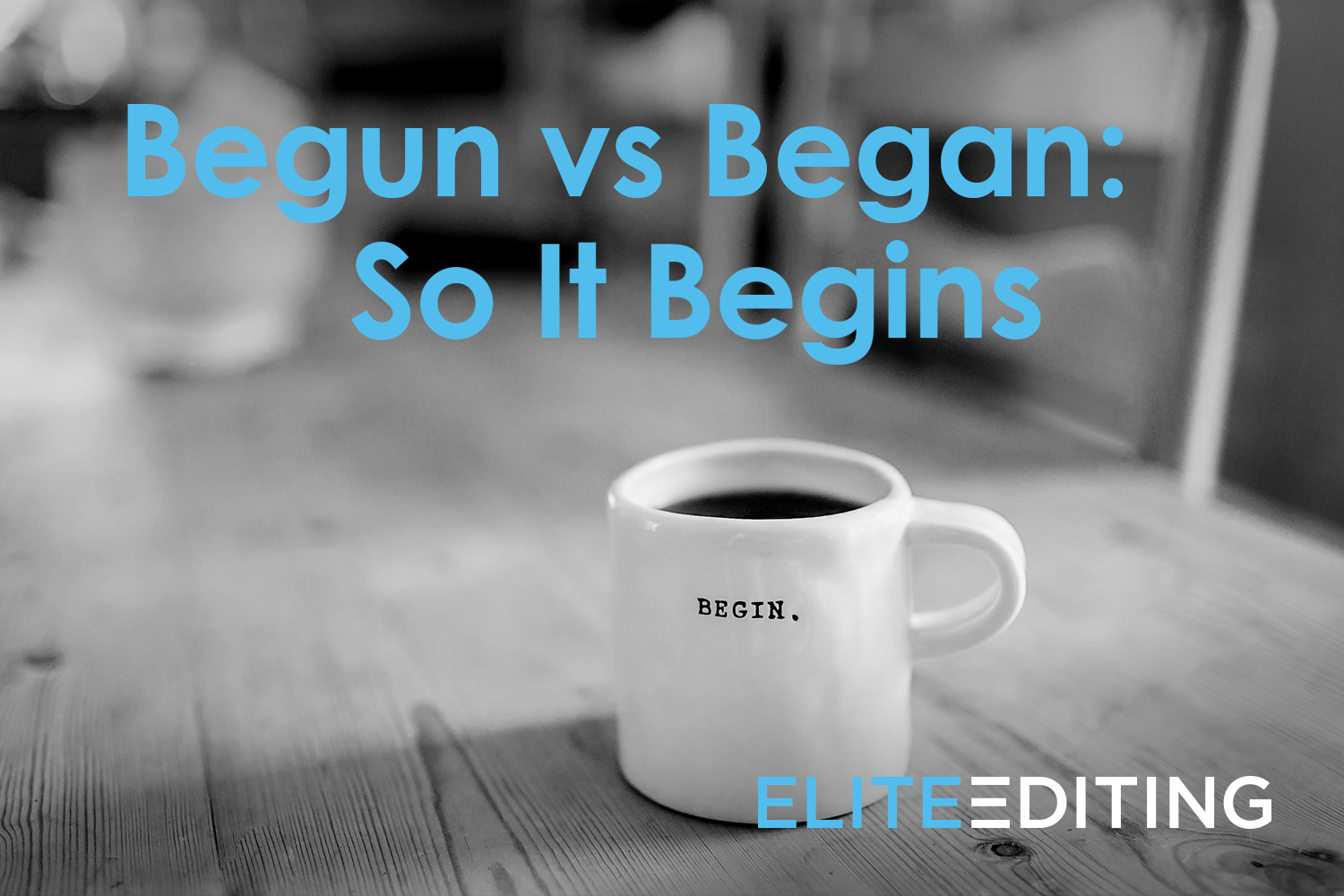
You use the verb begin to show that a process has started. Both begun and began are past tense forms of begin. Begun vs. began can be so confusing because begin is an irregular verb (also known as an “action verb,” or a word that shows that something is happening: run, paint, jump, etc.). An irregular verb is one that, when taking its past tense form, doesn’t follow the usual grammar rules. That’s one of the reasons that it’s so easy to mix up began and begun.
Knowing When to Use Begun vs. Began
The main thing to know about begun vs. began is that begun is the past participle form of the verb begin. That means it has to refer to something that happened in the past. However, for begun to be used properly, it has to be paired with another verb, like has, had, or have. Begin, on the other hand, is the simple past tense form, which in this case means it doesn’t get paired with has, had, or have. Some examples below will clarify how this works in practice.
Examples of Begun
Let’s look at two examples: the first example is incorrect, and the second is correct.
- Incorrect: I begun the essay when my little brother interrupted me.
- Correct: I had begun the essay when my little brother interrupted me.
As you can see, the correct example includes the word had, which is one of the verbs that must be paired with begun for the usage to be correct.
Examples of Began
Here are two examples of began. Again, the first example is wrong while the second is correct.
- Incorrect: The conference finally had began at eight thirty even though it was supposed to start at seven.
- Correct: Dinner began at six o’clock—right on time.
The examples above show that forms of the verb have are never paired with began when it’s being used in the past tense.
To review, let’s do just a few more begun vs. began examples. First we’ll look at two correct examples of begun and then two correct examples of began:
- I had begun to wrap up my project when my tablet crashed, erasing all my work.
- Now that they’re locked up in prison, both robbers have begun to rethink their actions.
- I stubbed my toe and began whining but then realized that there are much worse things that can happen to a person.
- My boat’s engine began to sputter, and I feared it might be low on gasoline.
Hopefully these examples clear up your confusion. Just remember that there’s always more to learn…your grammatical journey has only just begun!
YOU MIGHT ALSO LIKE
What Is an Adjective?
Adjectives serve a vital function in language. Without them, the world would be a flat, boring place. Want proof? Read the previous two sentences again—this…
Metaphors and Similes
There is such power in language—it shapes our ideas and reflects them. It can inspire or infuriate, heal or damage, inform or confuse. And it…
| 1. | Base Form (Infinitive): | Begin |
| 2. | Simple Past: | Began |
| 3. | Past Participle: | Begun |
| 4. | Present Participle: | Beginning |
| 5. | 3rd Person Singular: | Begins |
| Began |
| Began is the past tense of the word begin. |
Begin past participle
| Begun |
| Begun is the past participle of the word begin. |
Begin verb forms V1 V2 V3 V4
| Infinitive | Past Simple | Past Participle | Present Participle |
|---|---|---|---|
| Begin | Began | Begun | Beginning |
Conjugation of Begin
| Simple / Indefinite Present Tense |
| I begin to work. |
| He/She/It begins to work. |
| You/We/They begin to work. |
| Simple Past Tense |
| I began to work. |
| He/She/It began to work. |
| You/We/They began to work. |
| Simple Future Tense |
| I will/shall begin to work. |
| He/She/It will begin to work. |
| You/We/They will/shall begin to work. |
| Present Continuous Tense |
| I am beginning to work. |
| He/She/It is beginning to work. |
| You/We/They are beginning to work. |
| Past Continuous Tense |
| I was beginning to work. |
| He/She/It was beginning to work. |
| You/We/They were beginning to work. |
| Future Continuous Tense |
| I will be beginning to work. |
| He/She/It will be beginning to work. |
| You/We/They will be beginning to work. |
| Present Perfect Tense |
| I have begun to work. |
| He/She/It has begun to work. |
| You/We/They have begun to work. |
| Past Perfect Tense |
| I had begun to work. |
| He/She/It had begun to work. |
| You/We/They had begun to work. |
| Future Perfect Tense |
| I will have begun to work. |
| He/She/It will have begun to work. |
| You/We/They will have begun to work. |
| Present Perfect Continuous Tense |
| I have been beginning to work. |
| He/She/It has been beginning to work. |
| You/We/They have been beginning to work. |
| Past Perfect Continuous Tense |
| I had been beginning to work. |
| He/She/It had been beginning to work. |
| You/We/They had been beginning to work. |
| Future Perfect Continuous Tense |
| I will have been beginning to work. |
| He/She/It will have been beginning to work. |
| You/We/They will have been beginning to work. |
More verb past tense
- Bend
- Bet
- Bind
- Bite
- Bleed
/ / Uncategorized
What is the Difference Between Began and Begun?
Contents
- 1 What is the Difference Between Began and Begun?
- 2 Using Began in a Sentence
- 3 Using Begun in a Sentence
- 4 Remembering Began vs. Begun
- 5 Outside Examples
- 6 Quiz: Begun vs. Began
- 7 Article Summary
Began and begun are both different forms of the same verb. Therefore, they have the same definition, but are appropriate in different tenses and grammatical contexts.
Began is the simple past tense form of begin, which means to start.
- It all began one day about ten years ago.
Begun is the past participle form of begin.
- We can’t stop this process once it has begun.
Now, let’s look at the specific ways to use these conjugations of begin, as well as how to avoid common mistakes.
Using Began in a Sentence
When to use began: Began is the simple past tense form of begin. It means to commence or to start.
For example,
- You’re late! Dinner began at 7 o’clock and it is now almost 8:30!
- The snow began falling early in the evening last night and had accumulated to over two feet by early this morning.
There are several idioms and expressions that use the word begin. A couple of these, which are listed below, can also occur in the simple past:
- a journey of a thousand miles begins with a single step: a big project starts with a small action
- The race to find a cure for the horrible disease began with a single step: the discovery of bacteria.
- to begin to see: to start to understand
- When my sister stole my money I began to see that she had become a criminal.
Began occurs more frequently than begun.
Using Begun in a Sentence
When to use Begun: Begun is the past participle form of begin. It appears after the helping verb have in the perfect tenses.
For example,
- You can’t stop the process now. It has already begun.
- By the time the racer realized he had forgotten his shoes, the race had begun.
- Have you begun your homework yet?
There is one proverb that uses begun:
- well begun is half done: if you get a good start to a project, completing the rest of it will be easy
- I know you’re worried about writing a ten-page essay, but you know what they say! Well begun is half done. You’ve already done the research and you’re an expert on the topic. Now all you have to do is write down what you already know.
Between the synonyms begin, start, and commence, start is the most common and commence is the most formal.
Remembering Began vs. Begun
It is possible to use the spelling of these words to remember the meanings.
These words are spelled exactly the same except for the a and the u difference. Usually, when students of English learn the three forms of irregular verbs, they learn in the order of base form, simple past tense form, and past participle form (like go, went, gone). Just as the past tense comes before the past participle form, a comes before u alphabetically.
Alternatively, there are many other irregular verbs that include a stem change from i to a to u from base form to past simple to past participle. Some examples of verbs in that order include swim, swam, swum; drink, drank, drunk; sing, sang, sung; and ring, rang, rung.
Outside Examples
- Hundreds of fans began airing their complaints via social media that they had trouble streaming the pre-fight show via Showtime. –New York Post
- They had been waiting out the storm Saturday in Yeselia Castro’s home, but then the waters began pouring in. They tried putting the children on tables and on the bed to keep out of the water. Their brother-in-law, Jesus, even got on the roof. –LA Times
- Both Cabrera and Wilson have begun the appeals process, Ausmus said before Friday’s game against the Chicago White Sox. –USA Today
- The great eclipse migration has begun. And for those hitting the road late, maybe pack a lunch. Oh, and don’t forget some extra gas. You’re probably already too late for eclipse glasses or a place to stay. –Denver Post
Quiz: Begun vs. Began
Instructions: Fill in the blank with the correct word, either begun or began, in the correct form.
- I may not have __________ this fight, but I sure will finish it!
- The play has already _____________ so the theater won’t let the patrons enter.
- The whole rivalry _______________ about 100 years ago.
Article Summary
Should I use began or begun? These two words are both different forms of the past tense of begin. To know which one to use, you must know if you are using the simple past tense or the perfect tense.
- Began should occur in the simple past tense, for actions that completed in the past.
- Begun should occur in the perfect tenses, as the past participle.
Make sure you are aware of this difference when choosing which of these words to use.
Quiz Answers
- begun
- begun
- began
3 формы глагола
To begin — неправильный глагол, его формы нужно выучить:
Все три формы отличаются между собой лишь одной буквой. Повторите несколько раз вслед за диктором, отчетливо произнося И – Э – А, затем приступайте к упражнениям и будьте внимательны!
| begin — began — begun | начинает — начал, начинал — начал |
Примеры
Прочитайте предложения и обратите внимание, в какой форме стоит глагол to begin:
| I begin to realize how important this is | Я начинаю понимать, насколько это важно — V1 |
| I began to exercise in the mornings | Я начал упражняться по утрам — V2 |
| I’ve begun my training session about an hour ago | Я начал тренировку примерно час назад — V3 |
Упражнение
Выберите подходящую форму глагола
| I’m ready to begin | Я готов начать |
| We begin in an hour | Мы начинаем через час |
| We began on Tuesday | Мы начали во вторник |
| I’ve begun my trial | Я приступил к своему испытательному сроку |
| People began to realize the importance of clean energy production | Люди начали осознавать важность производства чистой энергии |
BEGINS — начинает (он, она, оно)
Форма глагола begin в 3-м лице единственного числа (местоимения he, she, it) в настоящем простом времени — begins
| I begin to realize | Я начинаю понимать |
| He begins to realize | Он начинает понимать |
Чтобы запомнить все формы глагола begin, выполните еще одно упражнение 👇
| A new era has begun | Новая эра началась |
| I’ve begun cooking just before you called | Я начал готовить прямо перед тем, как ты позвонил |
| A great journey begins from the first step | Великое путешествие начинается с первого шага |
| If everyone is ready, I’ll begin | Если все готовы, то я начну |
| I began teaching 15 years ago | Я начал преподавать 15 лет назад |
Неправильные глаголы — таблицы, произношение, тренажер
Простой способ изучить 50 самых популярных неправильных глаголов. Хотите знать их все? Тогда переходите и тренируйтесь!


